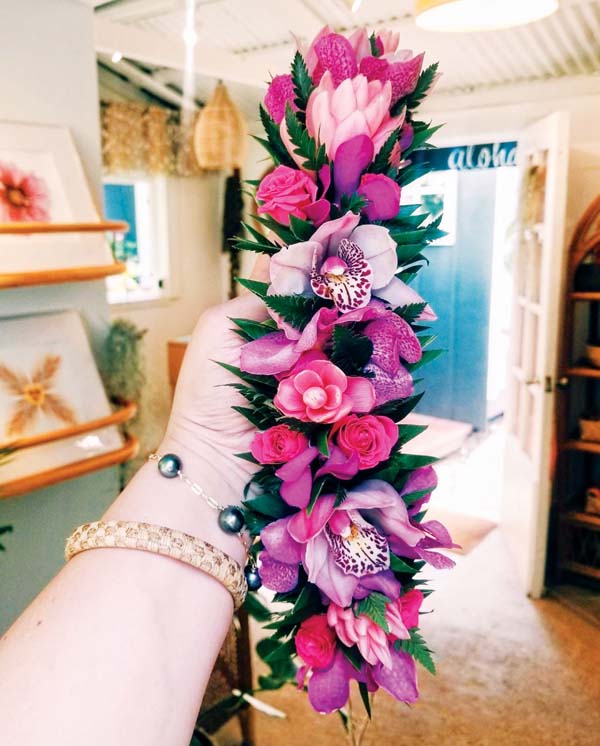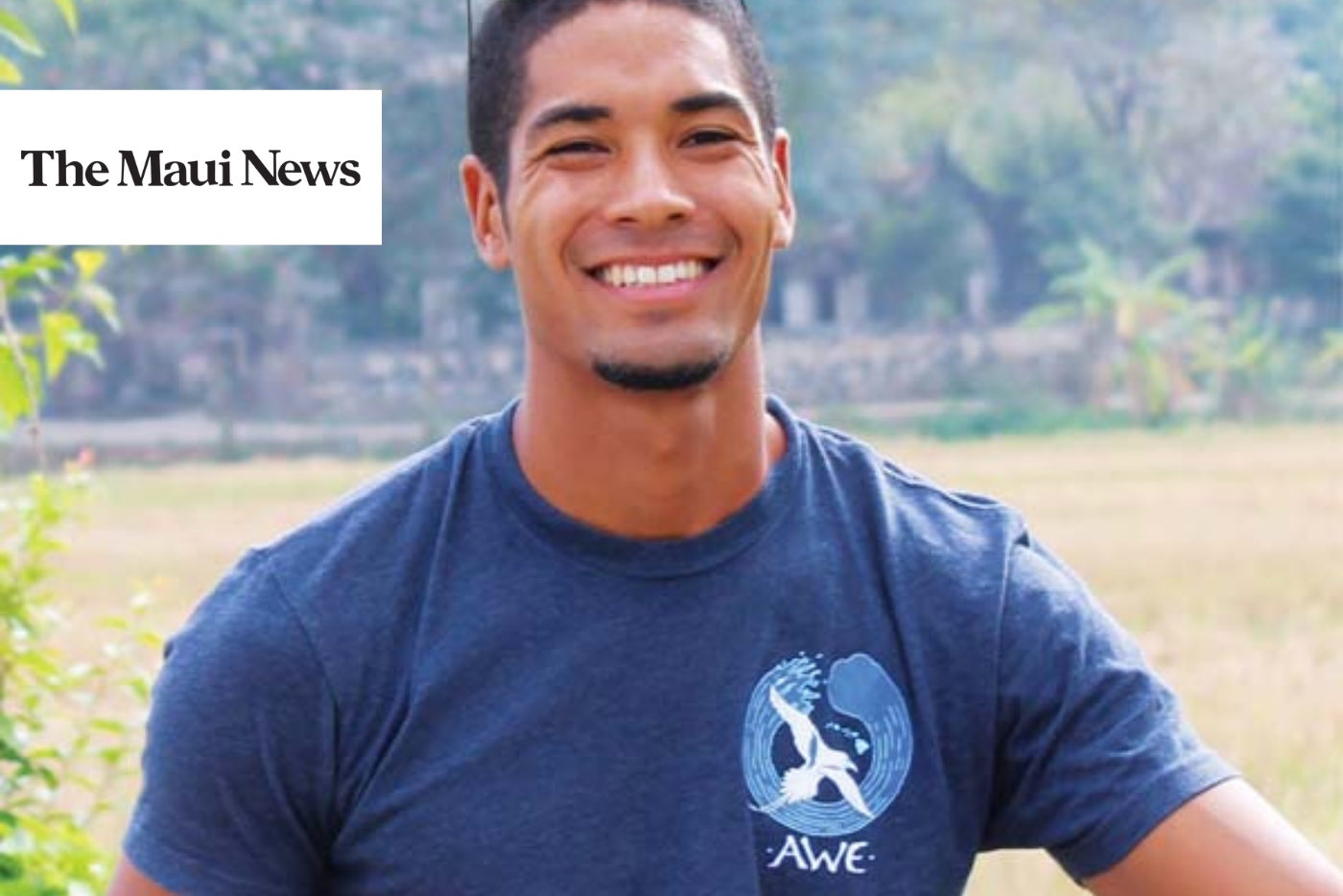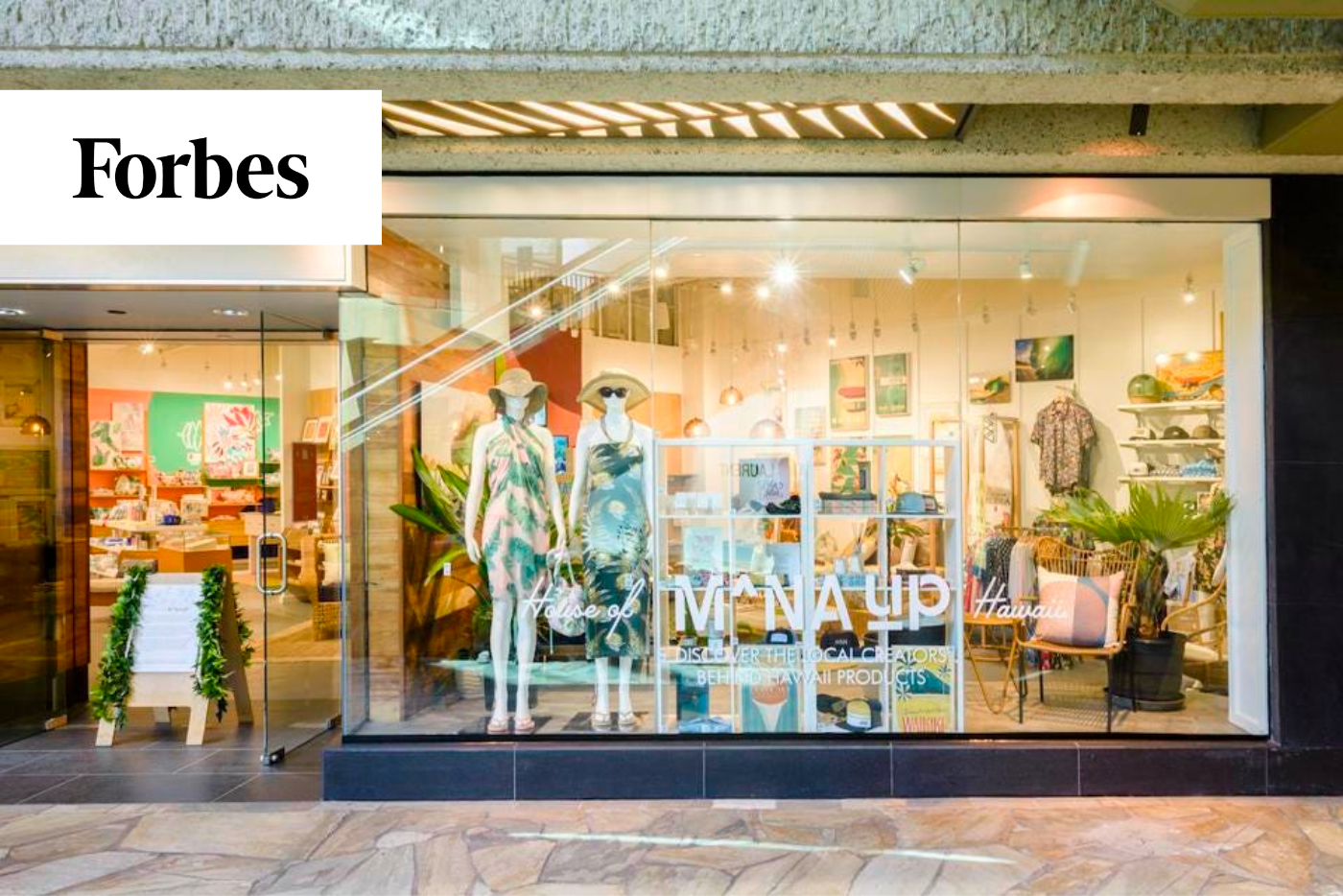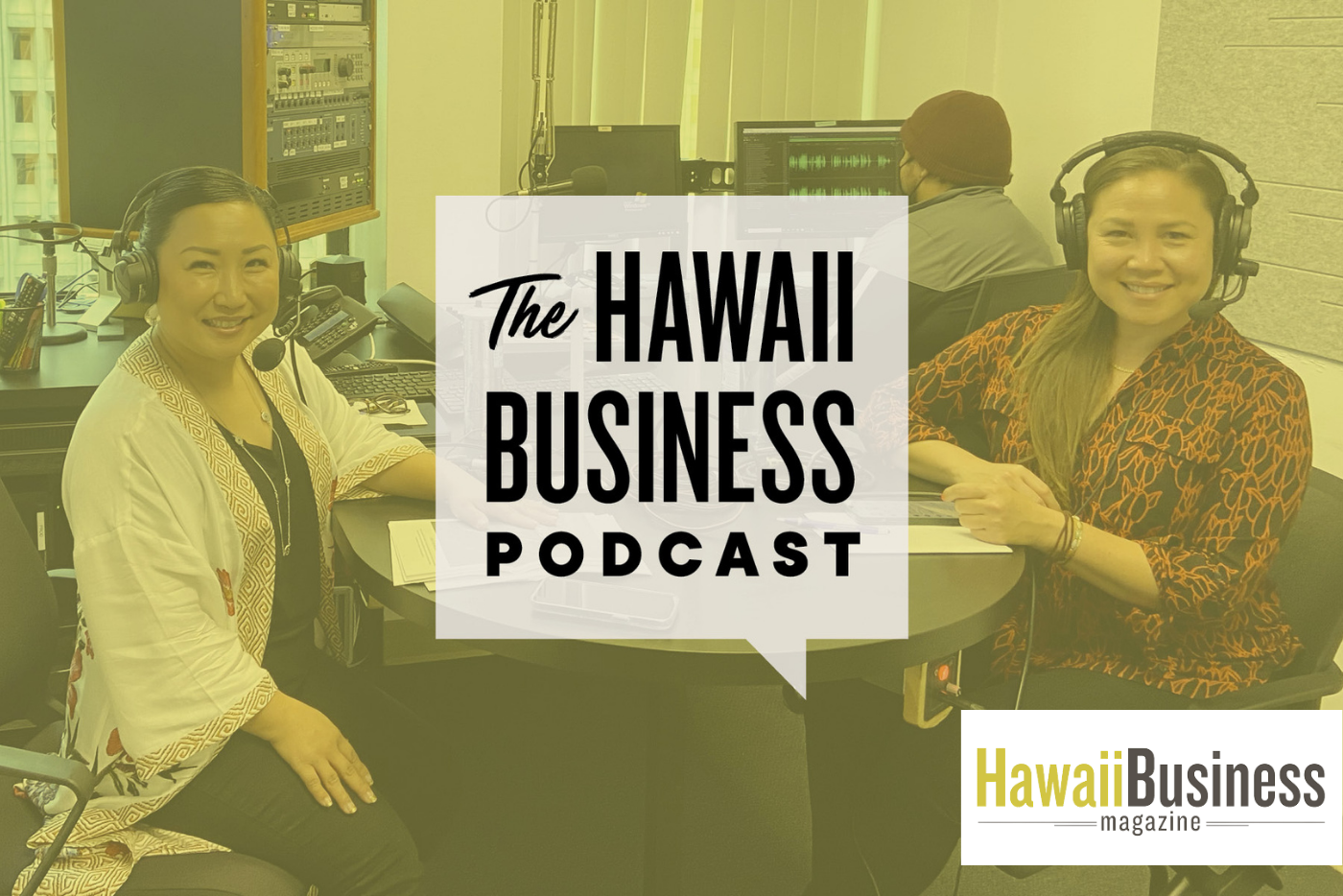Lei making, wildlife education, glass recycling businesses accepted into cohort
JUN 6, 2022DAKOTA GROSSMAN

Che Frausto – Advance Wildlife Education founder
Environmentalism, culture and conservation are what three Maui entrepreneurs have in common as they push to grow their businesses through Mana Up’s accelerator program.
Eleven entrepreneurs across the state, including Haku Maui, Advance Wildlife Education and Revive Glassworks from the Valley Isle, were chosen to participate in the annual six-month local program, which offers educational opportunities and helps solve business challenges for Hawaii-based companies.
The companies that make up Cohort 7 were selected from Mana Up’s largest pool of applicants to date — the selection committee reviewed 138 applications from local businesses and interviewed 57 of them.
“I am very humbled and thankful for this opportunity to work with Mana Up. I know that they can help me take my business to the next level,” said Paia resident Che “Katsu” Frausto of Advance Wildlife Education. “I am very excited to be a part of this ohana of like-minded entrepreneurs, growing together and having professional mentors help our businesses further succeed.”
WILDLIFE EDUCATION

Britney Texeira – Haku Maui owner
Combining his passions for wildlife and art, Frausto created his own line of educational coloring books, some also offered in Hawaiian language, filled with Hawaii’s native plants and animals to inspire kids to develop a passion for saving the animals.
Launched in 2016, Advance Wildlife Education is now in eight states and over 60 retail locations, bringing awareness of conservation efforts far and wide.
“I was doing a lot of work in the field but felt I could help more by starting Advance Wildlife Education and being a bridge between the community and conservation organizations by spreading awareness, giving time, and money,” he said. “My mission is to educate and spread awareness on wildlife species not only in Hawaii, but worldwide, so increasing collaborations overseas.”
On Sunday, he recalled helping a grandmother buy a book for her 5-year-old granddaughter, who loved the gift and started coloring in it nonstop. She then told her family at dinner that night that she wanted to become a wildlife biologist when she grows up and began doing her own research of Hawaiian species.
“Since starting six years ago, I have had the opportunity to talk directly to tens of thousands of people of all ages and places. More and more frequently I have heard stories like this from families and visitors, and this is why I do what I do so passionately,” Frausto said. “I hope to educate and inspire the community and next generation to take care of the aina and to bring awareness to our native species.”

Matt Laundrie – Revive Glassworks founder
Networking through Mana Up, the wildlife biologist also hopes to teach “responsible tourism” and create an environment of respect for the native species that people from all over the world come to see in Hawaii.
“When locals and tourists alike go through my books, they learn about how fragile and important the environment is and become more sustainably conscious,” he said.
Through this program, he wants to learn how to make his business self-sustainable and provide more jobs and opportunities in Hawaii.
He is currently collaborating with Friends of Midway Atoll to produce a book covering the Northwestern Hawaiian Islands, as well as working with the Council for Native Hawaiian Advancement on developing a curriculum for a Hawaiian book for school use.
CULTURE, HISTORY THROUGH LEI MAKING

Wildlife Biologist Che Frausto, founder of Advance Wildlife Education, created about 20 coloring books that are filled with fun and interactive pictures of native species and animals. Frausto said he “gambled on my dreams and self-published” his first book in 2017. Advance Wildlife Education Che Frausto photo
Haku Maui specializes in traditional native Hawaiian lei and lei-making workshops and also offers fresh pre-made lei at the shop located in Makawao town.
“Our true mission is to preserve the history and quality of traditional Hawaiian lei with the hopes of educating as many people as we can on what lei really means, and the different ways they are made,” said founder Britney Texeira. “We, ourselves, are forever students, but meet a lot of people in our kaiaulu who have always purchased lei, and never learned to make them. Now those people may be parents or even grandparents that are ready to make lei for their keiki and if we can help them on that journey, then I consider that a success.”
The business started in 2017 and has slowly expanded since, including a booming year in 2021 after being closed the majority of 2020 amid the pandemic.
After looking around at what was being offered for lei and lei making, Texeira noticed that most classes that were being offered were catered to the tourism industry “with little to no insight on Hawaiian culture, lei in Hawaiian history, the meaning of lei or even using flowers and materials that are grown here in Hawaii.”
“I was in shock,” she said on Saturday. “I knew there had to be a better way. There had to be more to it.”

Haku Maui, a Makawao business chosen for Mana Up cohort 7, specialize in custom, hand-crafted haku lei, also known as floral crowns, for celebrations, like weddings and graduations, as well as hosts lei-making workshops. HAKU MAUI photo
This initiated their mission for lei workshops and creating custom, handcrafted haku lei for celebrations, like weddings, bridal showers, anniversaries, graduations, baby showers and more.
Texeira said her favorite things about Haku Maui are gathering the flowers, foliage and other needed materials, as well as meeting new people from the community and around the world, and “knowing the story behind each lei that my family and I make.”
And, being a part of Mana Up’s Cohort 7 means new opportunities.
“For me, this means they see something in our business and in myself as the owner,” Texeira said. “They understand our mission, our product and see a scalable aspect of our company and are ready to work directly with us to help make that happen in a way that is true and organic to who I am as a person and as a business owner.”
Haku Maui is currently working with Wailani Artates of Artistry8 on rebranding the business as well as creating a few specialty products.

Revive Glassworks repurposes Maui’s thrown-out bottles and creates customizable glass products, ranging from vases, drinking glassware, planters, lanterns and lighting fixtures. Revive Glassworks Photo
ONE PERSON’S TRASH IS ANOTHER’S TREASURE
Revive Glassworks repurposes Maui’s thrown-out bottles and creates customizable glass products, ranging from drinking glassware, tea candles, storage containers, lanterns and lighting fixtures.
Formed in 2020, this business reduces the amount of glass that heads to the landfill.
“Our main goal is to take all the glass from the state of Hawaii and have it brought to the island of Maui, which it will then be processed, crushed and melted into new jars and bottles for the food and beverage industry,” founder Matt Laundrie said. “Our mission is to prevent the state of Hawaii from having to ship its glass off island across the ocean, causing taxpayers millions of dollars and causing the environment greatly with carbon emissions that are put in the air with the transport of our glass.”
After discovering that Hawaii is one of 12 redemption states in the nation that has clean and uncontaminated glass that can be easily recycled or repurposed, and seeing there was a “huge need” for glass manufacturing, Laundrie started the first on-island glass recycling plant in Kahului during the COVID-19 pandemic as a pilot project for a larger facility.
“There were many challenges, but we overcame them all with perseverance,” he said. “We had many challenges due to shipping delays on important equipment that was needed to build our factory as well as the COVID bans on certain countries for experts to fly to Hawaii to help us set up our factory.”
As the only glass manufacturer in the state, the environmentally friendly business now partners with hotels across Maui who purchase recycling services or unique recycled glass products.
“I’m very honored and lucky to have been chosen and it’s exactly what Revive Glassworks needs to expand our awareness and clientele,” Laundrie said. “With the help of Mana Up, we will be able to take our products to a global market as well as gain more attention to the state of Hawaii with restaurants, hotels, retail locations and online sales.”
Laundrie said that he enjoyed building this business to fill a “very crucial need” in the glass manufacturing industry.
“Businesses, restaurants and other retail locations like to sell locally made products and also like to keep it green and we are the only green glass manufacturing in the state of Hawaii as well as one of the only ones in the entire USA,” he added.
Since Mana Up launched in 2017, 63 local companies have graduated from the six-month accelerator program and the additional 11 companies (Cohort 7) are participating this year in the program, which launched last week.
About 28 percent of 2022 applicants were companies that started since the beginning of the COVID-19 pandemic.
“We’re always happily surprised by the quality and ambition that each cohort brings to Mana Up. This cohort highlights sustainability, the environment and culture through their products, hitting on global trends that put Hawaii at the forefront,” said co-founder Brittany Heyd in a news release. “We couldn’t be more excited to work with this year’s impressive group of entrepreneurs, and be part of their journeys as they grow to global markets.”



